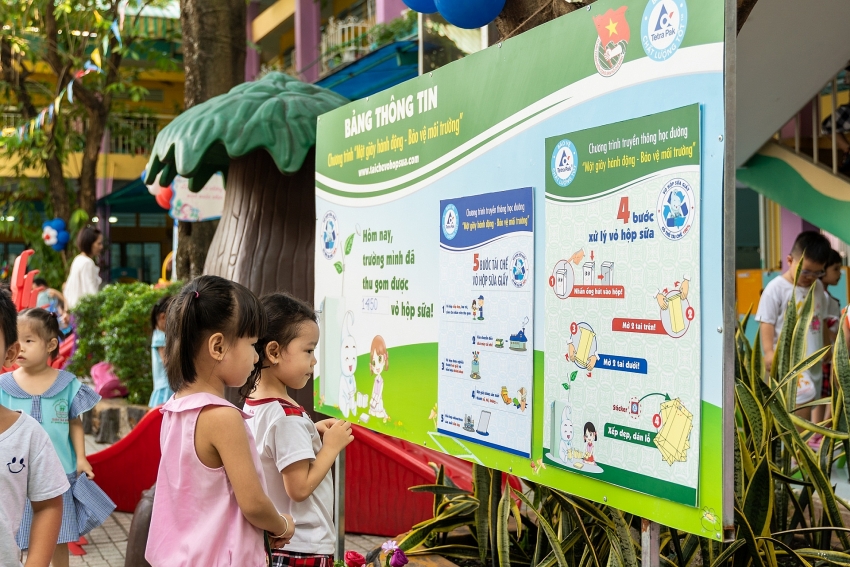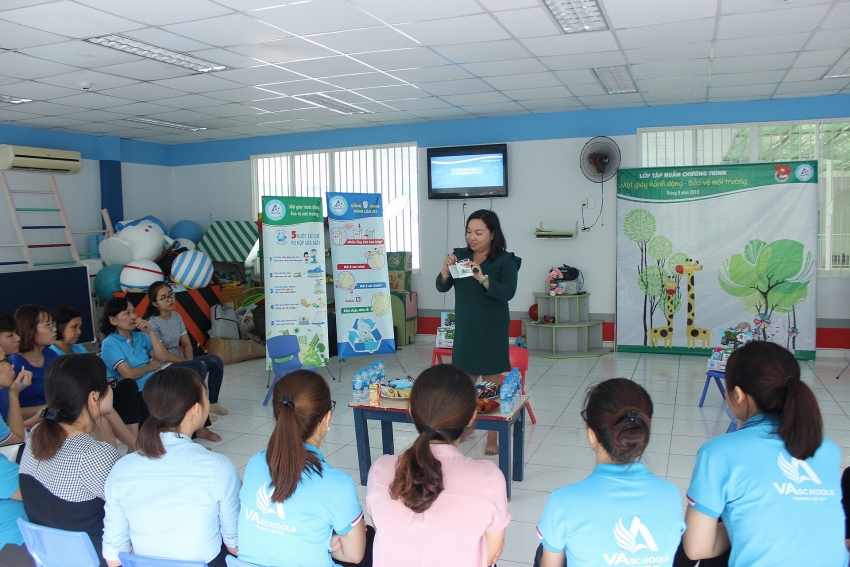Tetra Pak dedicates efforts to building low-carbon circular economy
 |
| Tetra Pak Vietnam pilots the recycling programme “One Second of Action to Protect the Environment” at schools |
Tetra Pak is dedicated to support all 17 United Nations Sustainable Development Goals (SDG), giving priority to those where the company could have the greatest influence and impact. The report also features Tetra Pak’s achievements on its sustainability journey based on its cutting-edge technologies, good management, and future human resources.
The circular economy is a regenerative model that reduces waste and keeps materials in use for longer. As such, it is close to Tetra Pak’s business that is designed to minimise waste and optimise the use of resources. The company has been implementing action plans to reduce the lifecycle impact of its packaging, processing, and service solutions.
Fully renewable package
In 2018, Tetra Pak took the first steps to address marine litter by investing heavily in a new closures portfolio in line with the company’s strategy to build a fully renewable package.
The company plans to spend approximately €100 million ($112 million) per year for the next five years on developing alternative solutions to plastic straws, such as paper straws, tethered caps, and other drink-from systems.
Tetra Pak expects to industrialise the production of paper straws on a scale that will meet global demand by 2025. It will incorporate a minimum of 2 per cent recycled plastics content on average across beverage cartons by 2025, subject to technical and economic availability of suitable food-grade recycled plastic.
Responsible sourcing
Tetra Pak sources 3.1 million tonnes of base materials (paperboard, polymer, and aluminium) every year. The company fully understands that the way it buys has a profound impact on people, the environment and the economy.
Some 71 per cent of the raw material Tetra Pak puts in its carton packages is paperboard. In 2018, Tetra Pak reached the major milestone of helping customers produce more than 460 billion FSC (Forest Stewardship Council™) labelled packages since 2007.
Tetra Pak has been on the CDP A-List Forests Programme for the last three years in recognition of its work in managing and mitigating risks associated with the sourcing and production of timber.
| Tetra Pak’s long-term ambition is for all chilled and ambient packages to use renewable and recycled polymers. |
Tetra Pak’s long-term ambition is for all chilled and ambient packages to use renewable and recycled polymers. Tetra Pak’s supplier is also establishing a Bonsucro Chain of Custody from sugar cane plantation to their production facility for renewable polyethylene.
Some 60 per cent of the bioethanol used for its renewable polyethylene was sourced with Bonsucro Certification.
Heavy investment in recycling
Having invested more than 25 years into exploring and evaluating recycling technologies, Tetra Pak envisions that all beverage cartons will be collected for recycling, and zero beverage cartons become litter or are sent to landfill. The company did invest €20 million ($22.4 million) to support recycling infrastructures from 2012 to 2018.
Environmentally friendly technologies
In May 2018, Tetra Pak launched EncaptTM technology for high-capacity separators for the dairy industry, helping to reduce the air pressure around the spinning bowl which lowers the air friction and thereby energy consumption.
The combination of the new Encapt™ technology and the established AirTight design enables as much as 40 per cent savings compared to alternative separator designs.
In addition, Tetra Pak has made great improvements to its JNSD beverage line architecture by combining UV, filtration, and aseptic technologies. The white paper case study shows that the results would be energy reduction of 67 per cent and water savings of 50 per cent in juice production.
The Tetra Pak® Extrusion Wheel lets customers make premium, uniform, high-quality ice cream products at the highest capacity and lowest cost in the industry.
The Extrusion Wheel for ice cream products reduces waste in 98 per cent line yield and records a maximum level of 2 per cent waste compared to the usual 8 per cent.
Eliminating climate impacts
In 2016, Tetra Pak was the first-ever company in the food packaging industry to have climate impact reduction targets approved by the Science-Based Targets (SBT) initiative.
The company committed to reducing its operational GHG emissions by 42 per cent by 2030 and 58 per cent by 2040, from a 2015 baseline, and to reducing GHG emissions across the value chain per unit of revenue by 16 per cent by 2020 from a 2010 base-year.
As working on the new strategy, Tetra Pak is looking at how best to ensure alignment with the latest science that indicates the need to keep global temperature increase below 1.5°C.
Renewable energy
Tetra Pak is on track to have 80 per cent of its operations supplied with renewable electricity by 2020, and 100 per cent by 2030. The company is evaluating how Tetra Pak can directly initiate new renewable projects in the regions where it operates.
Sustainable supply chain
Tetra Pak’s supply chain accounts for 45 per cent of the greenhouse gas emissions in its value chain. Tetra Pak works closely with suppliers and partners to identify efficiencies, both in their operations and through their own supply and the company formally evaluate supplier sustainability performance annually.
Sustainability in Vietnam
Vietnam will also see Tetra Pak adopt its global sustainable strategy at its local business. Although cartons are but a tiny fraction of total consumer packaging waste in the country, Tetra Pak Vietnam sustains a strong and abiding commitment to sustainable programmes to promote carton package recycling through partnerships.
 |
| Teachers are instructed on collecting and recycling carton packages |
In particular, Tetra Pak Vietnam has established strong partnerships with four collectors, two recyclers, and set up a chain of public drop-off stations in Hanoi and Ho Chi Minh City. The company is planning to expand its partnerships in the future to promote carton package collection and recycling.
Tetra Pak Vietnam ran a school recycling initiative covering more than 2,000 primary schools across Vietnam cumulatively during 2007-2013. Altogether, a million primary school students were encouraged to fold, flatten, and drop their used cartons into bins for recycling. In the years to come, the company is set to expand this model to more than 1,000 schools in Hanoi and Ho Chi Minh City.
What the stars mean:
★ Poor ★ ★ Promising ★★★ Good ★★★★ Very good ★★★★★ Exceptional
Related Contents
Latest News
More News
- Trung Nam-Sideros River consortium wins bid for LNG venture (January 30, 2026 | 11:16)
- Vietnam moves towards market-based fuel management with E10 rollout (January 30, 2026 | 11:10)
- Envision Energy, REE Group partner on 128MW wind projects (January 30, 2026 | 10:58)
- Vingroup consults on carbon credits for electric vehicle charging network (January 28, 2026 | 11:04)
- Bac Ai Pumped Storage Hydropower Plant to enter peak construction phase (January 27, 2026 | 08:00)
- ASEAN could scale up sustainable aviation fuel by 2050 (January 24, 2026 | 10:19)
- 64,000 hectares of sea allocated for offshore wind surveys (January 22, 2026 | 20:23)
- EVN secures financing for Quang Trach II LNG power plant (January 17, 2026 | 15:55)
- PC1 teams up with DENZAI on regional wind projects (January 16, 2026 | 21:18)
- Innovation and ESG practices drive green transition in the digital era (January 16, 2026 | 16:51)

 Tag:
Tag:

























 Mobile Version
Mobile Version